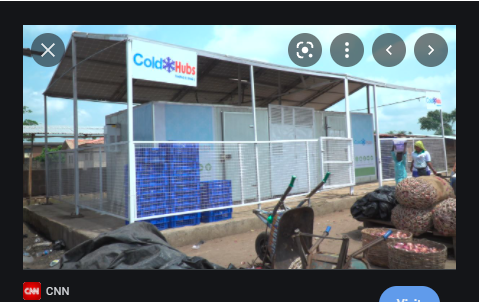By Jeph Ajobaju, Chief Copy Editor
ColdHubs is using solar energy to reduce N3.5 trillion food waste through its operation of cold storage facilities in 22 states, with plans to expand to all the 36 states in the quest to transition from food waste and hunger to food sufficiency.
About 47 per cent of Nigerian farmers lack access to storage facilities, and the figure could be as high as 60 per cent for tubers, fruits, and vegetables, according to SBM Intel, a geopolitical research and strategic communications consulting firm.
This costs the country N3.5 trillion in post-harvest loss every year as a lack of proper storage facilities combines with bad roads to waste hard earned crops whose prices keep on rising, adds Onyeka Akumah, Founder and Chief Executive of Farmcrowdy.
Farm4Me has joined the two firms to advocate that post-harvest technology has to be adopted to curb the huge losses.
And CNN reports how ColdHubs is already doing that with farmers, merchants, and consumers reaping benefits.
Harvest preservation, one state at a time
In the bustling Ogere Market in Ogun State, the race is on to sell fresh produce early in the day. By noon, the sun is at its peak, and with temperatures soaring, food spoils fast.
As the day wears on, CNN explains, food can sell at less than half of its original value, slashing profits for retailers and farmers.
That’s why Nnaemeka Ikegwuonu decided to take a fresh approach to food waste. He’s the founder of ColdHubs, which provides solar-powered food storage units designed for markets and farms.
The 39-year-old has won countless awards for the initiative and has just been announced as the joint winner of the $1.5 million AYuTe Africa Challenge, for promising young innovators who are using technology to reimagine food production on the continent.
Officially launched in 2015, ColdHubs now has 54 units in 22 states across Nigeria. More than 5,250 smallholder farmers, retailers, and wholesalers use its cold rooms and in 2020, the company stored 40,000 tons of food, reducing waste and increasing farmers’ profits.
“This is food meant for human consumption that we typically lose along the supply chain, either during harvesting, transportation, or distribution,” says Ikegwuonu.
“The mission really is to reduce food spoilage due to lack of cold food storage at key points along the food supply chain.”
Needless food waste crisis
Nigeria is ranked 100 out of 113 countries on the Global Food Security Index. Over 88 million people in the country face food insecurity and 12 per cent are undernourished, CNN adds.
The problem isn’t a lack of food, though: it’s an excess of waste. An alarming 40 per cent of the food Nigeria produces every year is lost before it even reaches consumers.
That’s equal to 31 per cent of its total land use, according to the World Bank, and accounts for 5 per cent of the country’s greenhouse gas emissions.
ColdHubs are 10-foot-square cold storage units which keep produce fresh for up to 21 days. Conventional cold storage units of this size would be powered by diesel generators and require 20 to 30 liters of diesel every day, says Ikegwuonu
But by using solar panels instead, he says that across all its units, the company prevents over 1 million kilograms of CO2 entering the atmosphere each year, while powering the units 24/7.
According to the UN, food waste accounts for up to 10 per cent of global greenhouse gas emissions, so finding solutions to reduce waste could be vital in the fight against climate change.
Storing a crate of produce in the ColdHub costs around 25 cents per day, and has helped farmers and retailers double their monthly earnings, says Ikegwuonu.
“This has been achieved by selling produce that was previously thrown away, sold off at the right price.”
Expanding the technology in Nigeria and beyond
Looking to the future, Ikegwuonu says ColdHubs is also developing technology to freeze produce, for fishing communities in the Niger Delta.
“Most of the coastal communities don’t have access to energy at all,” he says, adding that these freezer storage units would also have the capacity to produce ice blocks.
He also wants to extend his social impact by creating gender parity and jobs in a country where around 35 per cent of all employment is in agriculture, and 90 per cent of rural livelihoods depend on it.
“We have been able to create about 66 new jobs for women,” he says. “Many of these women have become empowered and change agents in their households and communities.”
Ikegwuonu says his current focus is on expanding the business further in Nigeria – but in the next decade, he has his sights set on other countries struggling with similar food waste problems.
“The big dream for us is to solve the problem of food spoilage in Nigeria, and expand our technology and service to other African countries that have these challenges.”
Farm4Me signs tech deal to end harvest waste
Farm4Me Managing Director Adamu Adamu said the company has signed a Memorandum of Understanding (MoU) with Benue State University’s Centre for Food Technology and Research (CEFTER).
In his view, there is need for concerted efforts to restore and retain states like Benue that are known as the food basket of the nation, but this cannot be done without post-harvest technology.
“For instance, Benue State, which is regarded as the food basket of the nation produces a wide range of crops ranging from grains, tubers, to fruits and vegetables but quantities of these crops are lost due to lack of adequate post-harvest technologies,” Adamu announced in a statement reported by Nairametrics.
“It is a known fact that Benue State wears the toga as the food basket of Nigeria for her vast production of wide range of crops ranging from grains, tubers, to fruits and vegetables.
“We must revive this and ensure we explore opportunities created by technology initiative to create a turnaround.”
Adamu said Agripreneurs believe that with the partnership between Farm4Me and CEFTER, harvest waste will be effectively tackled to reduce hunger and poverty.
Tor Joe Iorapuu, a Professor and Benue State University Vice Chancellor, explained that the university established CEFTER through the support of the World Bank to address some of the challenges in agriculture.
The partnership would, among other things, engage communities, farmers, and industries in the dissemination of technology to curb post-harvest losses.
They are expected to help develop well trained students for this purpose.












